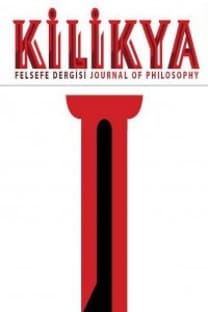Bilimde Değerlerin Rolü ve Feminist Duruş Noktası Teorisi
Bilimde değerlerin rolü, özellikle 20. yüzyılın ikinci yarısından itibaren yoğun bir biçimde tartışılmıştır. Bilimin değerlerden bağımsız olması gerektiğini savunmak, esasen, bilimin nesnelliğini ve güvenilirliğini savunmak anlamına gelmiştir. Feminist bilim felsefecileri, bu idealin, aslında kadınlığın dışlanması yoluyla inşa edildiğini açığa vurarak, bilimde değerlerin rolü tartışmasına farklı ve çok önemli bir yön kazandırmışlardır. Bu çalışmada, feminist bilim felsefesi içinde önemli bir pozisyonu işgal eden feminist duruş noktası teorisine yönelik bir incelemeden hareketle, etik ve politik değerlerin bilimin ayrılmaz bir parçası olmakla kalmayıp, bilimin gelişmesine katkıda bulunabileceği savunulacaktır. Ayrıca belli türden değerlerin bilime dahil edilmesinin yalnızca bilim üzerinde değil, aynı zamanda değerler alanı üzerinde de olumlu etkileri olacağı ileri sürülecektir.
Anahtar Kelimeler:
bilim, değerler, değerlerden bağımsız olma ideali, feminist duruş noktası teorisi, çeşitlilik
___
- Alcoff, L., & Potter, E. (1993). Introduction: When Feminisms Intersect Epistemology. L. Alcoff, & E. Potter (Dü) içinde, Feminist Epistemologies (s. 1-14). Routledge.
- Antony, L. M. (2002). L. M. Antony, & C. E. Witt (Dü) içinde, A Mind of One's Own: Feminist Essays on Reason and Objectivity (s. 110-153). Routledge.
- Code, L. (1993). Taking Subjectivity into Account. (L. Alcoff, & E. Potter, Dü) Feminist Epistemologies, 15-48.
- Collins, P. H. (1986). Learning from the Outsider within: The Sociological Significance of Black Feminist Thought. Social Problems, 33(6), s. S14-S32.
- Crasnow, S. (2013). Feminist Philosophy of Science: Values and Objectivity. Philosophy Compass, 8(4), s. 413-423.
- Crasnow, S. (2014). Feminist Standpoint Theory. N. Cartwright, & E. Montuschi (Dü) içinde, Philosophy of Social Science: A New Introduction (s. 145-161). Oxford University Press.
- Douglas, H. E. (2009). Science, Policy, and the Value-Free Ideal. university of Pittsburgh Press.
- Haraway, D. (1988). Situated Knowledges: The Science Question in Feminism and the Privilege of Partial Perspective. Feminist Studies, 14(3), 575-599.
- Harding, S. (1986). The Science Question in Feminism. Cornell University Press.
- Harding, S. (1987). Conclusion: Epistemological Questions. S. Harding (Dü.) içinde, Feminism and Methodology: Social Science Issues (s. 181-190). Indiana University Press.
- Harding, S. (1991). Whose Science? Whose Knowledge? Thinking from Women's Lives. Cornell University Press.
- Harding, S. (1993). Rethinking Standpoint Epistemology: "What is Strong Objectivity"? (L. Alcoff, & E. Potter, Dü) Feminist Epistemologies, 49-82.
- Harding, S. (2004). A Socially Relevant Philosophy of Science? Resources from Standpoint Theory's Controversiality. Hypatia, 19(1).
- Harding, S. (2007). Feminist Standpoints. S. N. Hesse-Biber (Dü.) içinde, Handbook of Feminist Research: Theory and Praxis (s. 45-69). Sage.
- Hartsock, N. C. (1983). The Feminist Standpoint: Developing the Ground for a Specifically Feminist Historical Materialism. H. Sandra, & M. B. Hintikka (Dü) içinde, Discovering Reality: Feminist Perspectives on Epistemology, Metaphysics, Methodology, and Philosophy of Science (s. 283-310). Springer.
- Hekman, S. (2004). Truth and Method: Feminist Standpoint Theory Revisited. S. Harding (Dü.) içinde, The Feminist Standpoint Theory Reader: Intellectual and Political Controversies (s. 225-242). Routledge.
- Intemann, K. (2010). 25 Years of Feminist Empiricism and Standpoint Theory: Where Are We Now? Hypatia, 25(4), s. 778-796.
- Intemann, K. (2021). Feminist Perspectives on Values in Science. (S. Crasnow, & K. Intemann, Dü) The Routledge Handbook of Feminist Philososphy of Science, 201-215.
- Intemann, K. (tarih yok). Diversity and Dissent in Science: Does Democracy Always Serve Feminist Aims? H. E. Grasswick (Dü.) içinde, Feminist Epistemology and Philosophy of Science: Power in Knowledge (s. 111-132). Springer.
- Lazreg, M. (1994). Women's Experience and Feminist Epistemology: a Critical Neo-Rationalist Approach. K. Lennon, & M. Whitford (Dü) içinde, Knowing the Difference: Feminist Perspectives in Epistemology (s. 45-62). Routledge.
- Longino, H. E. (1990). Science as Social Knowledge: Values and Objectivity in Scientific Inquiry. Princeton University Press.
- Nagel, T. (1986). The View from Nowhere. Oxford University Press.
- Potter, E. (2006). Feminism and Philosophy of Science: An Introduction. Routledge.
- Rolin, K. (2006). The Bias Paradox in Feminist Standpoint Epistemology. Episteme, 3(1-2), s. 125-136.
- Rolin, K. (2009). Standpoint Theory as a Methodology for the Study of Power Relations. Hypatia, 24(4), s. 218-226.
- Rolin, K. (2016). Values, standpoints, and scientific/intellectual movements. Studies in History and Philosophy of Science(56), s. 11-19.
- Rolin, K. (2021). Situated Knowledge and Objectivity. S. Crasnow, & K. Intemann (Dü) içinde, The Routledge Handbook of Feminist Philosphy of Science (s. 216-224). Routledge.
- Rose, H. (1983). Hand, Brain, and Heart: A Feminist Epistemology for the Natural Sciences. Signs, 9(1), 73-90.
- Rose, H. (1994). Love, Power and Knowledge: Towards a Feminist Transformation of the Sciences. Polity Press.
- Rouse, J. (2004). Feminism and the Social Construction of Scientific Knowledge. S. Harding (Dü.) içinde, The Feminist Standpoint Theory Reader: Intellectual and Political Controversies (s. 353-374). Routledge.
- Smith, D. (2004). Women's Perspective as a Radical Critique of Sociology. S. Harding (Dü.) içinde, The Feminist Standpoint Theory Reader: Intellectual and Political Controversies. Routledge.
- Spelman, E. V. (1988). Inessential Woman: Problems of Exclusion in Feminist Thought. Beacon Press.
- Tanesini, A. (2012). Feminist Epistemolojilere Giriş. (G. Demiriz, B. Binay, & Ü. Tatlıcan, Çev.) İstanbul: Sentez Yayıncılık.
- Wylie, A. (2003). Why Standpoint Matters. R. Figueroa, & S. Harding (Dü) içinde, Science and Other Cultures: Issues in Philosophies of Science and Technology (s. 26-48). Routledge.
- Wylie, A. (2012). Feminist Philosophy of Science: Standpoint Matters. Proceedings and Addresses of the American Philosophical Association, 86(2), s. 47-76.
- Wylie, A. (tarih yok). What Knowers Know Well: Women, Work and the Academy. H. E. Grasswick (Dü.) içinde, Feminist Epistemology and Philosophy of Science: Power in Knowledge (s. 157-182). Springer.
- Yayın Aralığı: Yılda 2 Sayı
- Başlangıç: 2014
- Yayıncı: Eray Yağanak
Sayıdaki Diğer Makaleler
Quine’ın Bütünselci Modeli Üzerine Bir İnceleme
Kant’ın Etik Anlayışı Doğrultusunda İnsanın Değeri Tartışması
Bilimde Değerlerin Rolü ve Feminist Duruş Noktası Teorisi
Stoa Felsefesinde Düşler ve Düş Görenler
Anglosakson Arkeoloji Geleneği Bağlamında Bilimsel Açıklamaların Doğası ve Statüsü
